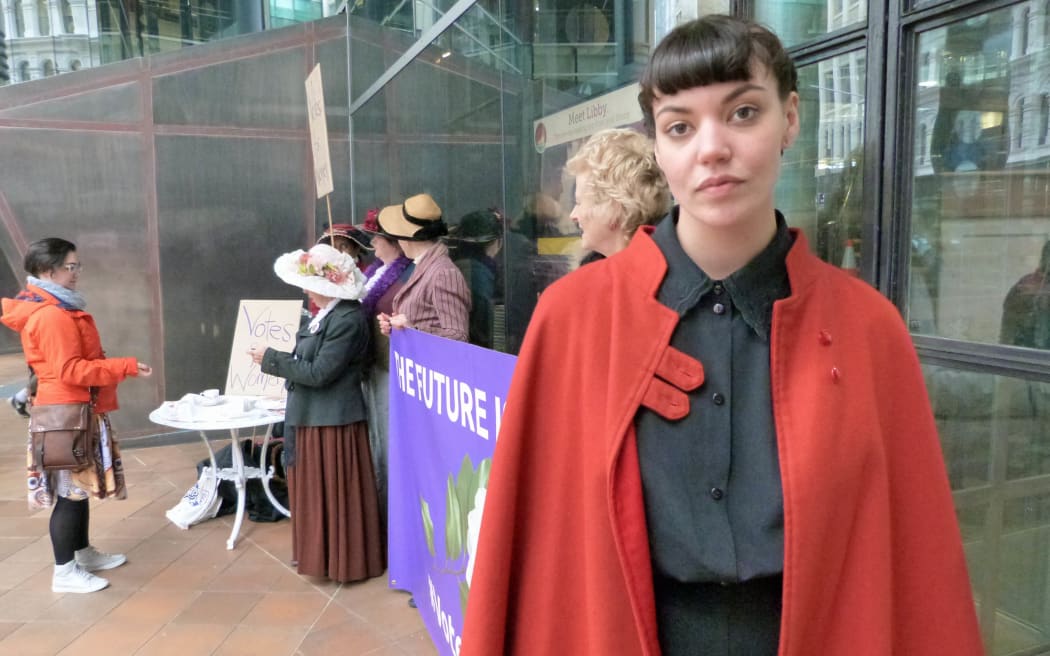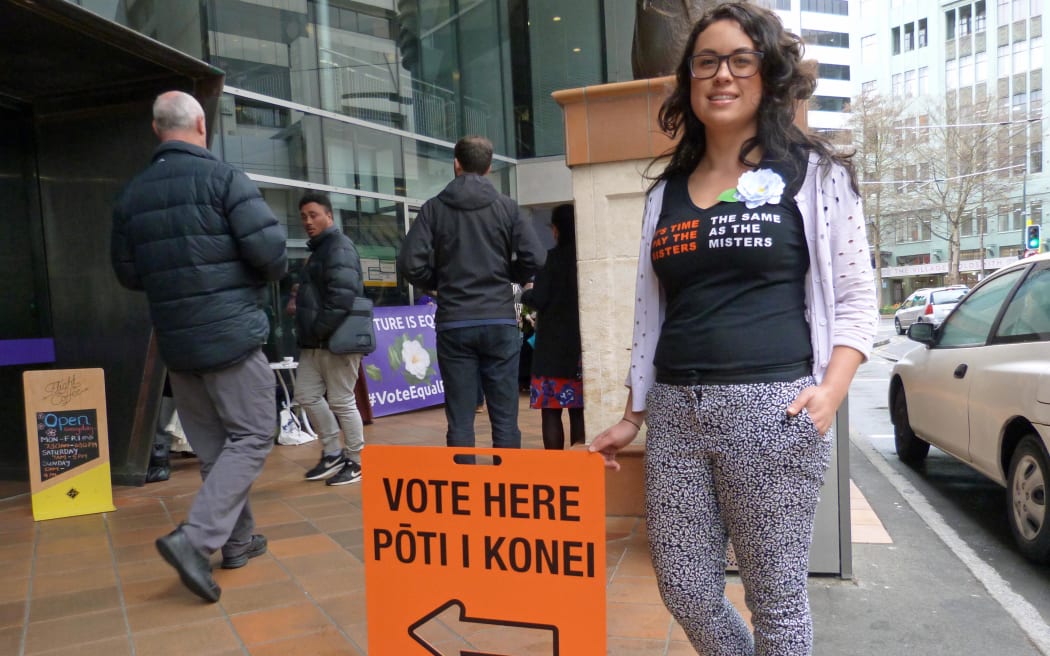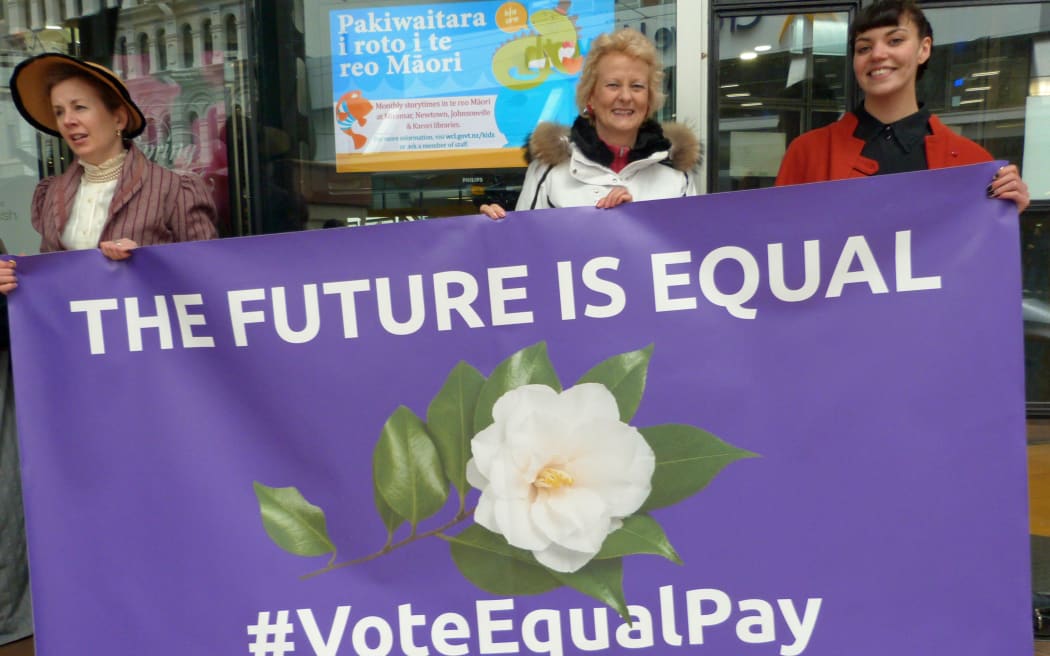The fight goes on.

Merinda Jackson. Photo: The Wireless/Max Towle
Women wearing suffragist dress gathered outside Wellington’s central library this afternoon. They periodically broke off into small groups and disappeared inside for a few minutes at a time.
They were voting.
On 19 September, 1893, Kate Sheppard and suffrage campaigners finally achieved the vote for women. A short time later, a Mrs McPherson became the first woman in New Zealand to cast a vote in Greymouth.
People have gathered around the country today to mark Suffrage Day. A poetry contest was held in Christchurch and political leaders were challenged on their gender equity records, while dozens walked through Nelson and Hamilton encouraging people to vote.
In Wellington, a group of activists demanded equal pay for equal work.
“I feel like being here is honouring the women who worked really, really hard to earn the right to vote,” said Gina Lockyer.
“It’s also honouring their further mission, which was equal pay for women. What that means to me is that skills that women inherently have are valued and recognised. Women grow people and nurture people and help make our society what it is. I want to see them better remunerated.”
Soon after she disappeared inside, but not before turning and saying: “I’m voting for equal pay today.”

Gina Lockyer. Photo: The Wireless/Max Towle
Siobhan Dilly, who works for a women’s advocacy group, said equal pay unfortunately seemed destined to be an issue for a long time yet.
“I want to encourage people to think about which party will do the most for equality and gender pay equity when they vote.”
“The work of suffragists in the 1800s was primarily about women getting the vote, but they were also talking about the role women have in the workplace. For me, this day is about that ongoing effort for parity.”
Merinda Jackson, who was there helping to represent the union New Zealand Educational Institute Te Riu Roa, said it was incredibly frustrating that equal pay was still such a big issue.
“We are fighting really hard with the Government and the Ministry of Education, and so it’s incredibly important for me to encourage people to understand that when they vote, they have the opportunity to have their voice heard in regards to gender equality.”
Siobhan Dilly said it was important for her, as a young woman, to have her voice heard on Suffrage Day.
“Young women are going to be bearing the burden of the decisions that are made now. In 60 years time, when today’s young women are well into retirement, if they weren’t paid their fair share during their lives and careers, it’s going to really hurt them.”

Many called for equal pay in Wellington. Photo: The Wireless/Max Towle
Merinda Jackson agreed, and said there was more to remember than one day in 1893.
“I think the generation that is coming through now has the opportunity to have that awareness of intersectionality and knowledge and power and while those early steps were so important, my generation still has the opportunity to make society less sexist and less racist and better for everyone.”
Last week, an investigation by RNZ's Insight showed about a quarter of partners in this country's biggest law firms are women, despite female graduates outnumbering men since the 1990s.
The Law Society’s President, Kathryn Beck said Suffrage Day is an opportunity for the legal profession to reflect on gender diversity and inclusion.
“As a nation we are proud of our status as the first country to give women the vote but the legal profession needs to work together to continue to advance and retain our women lawyers,” she said.
Women's Minister Paula Bennett used the occasion to praise her Government’s record.
“This Government has continued to support women. In the public sector 45 percent of people on state sector boards are women, 46 percent of women in senior leadership roles in the public service, we’ve introduced pay equity principles and we’ve settled a $2 billion pay equity claim for 55,000 care and support workers,” she said.
"We still have so much more to achieve though. We have a 9.4 percent gender pay gap. This recently reduced from 12 percent - but in 2017, we just shouldn't have one.”


